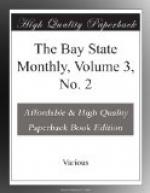Manuscripts were circulated; monasteries and schools were founded, and learning was somewhat diffused. The Saxon language is marked by three several epochs:
1st. From the irruption of the Saxons into Britain, A.D. 449, to the invasion of the Danes, including a period of 330 years.
2d. The Danish-Saxon period, continuing to the Norman conquest, A.D. 1066.
3d. The Norman-Saxon era, running down to the close of Henry II’s reign. Of the first period, but a single specimen remains, and that a quotation by King Alfred; of the 2d period, numerous specimens both in verse and prose are extant; with the last period, the annals of English poetry commence.
The three dialects of these three literary epochs illustrate fully the changes which the old Saxon tongue underwent during the five centuries of its growth into the modern English.
Learning was chiefly confined to the church, during the dark ages; of course, the great lights of Saxon England were prelates, except Alfred, and most of them wrote in Latin.
The venerable Bede (born 673, died 735), as he is styled, who wrote in the eighth century, was a profoundly learned man for those times. His writings embrace all topics then included in the knowledge of the schools or the Church. His works were published at Cologne, in 1612, in eight folio volumes. Another of the ornaments of this century was Alcuin, librarian and pupil of Egbert, Archbishop of York. He enjoyed a European reputation; was invited to France, by Charlemangne, to superintend his own studies; and was thought by some to have been the founder of the University of Paris. He was contemporary with Bede, was acquainted with the Greek, Latin, and Hebrew, languages and composed treatises on music, logic, rhetoric, astronomy and grammar; besides lives of saints, commentaries on the Bible, homiles, epistles and verses.
From the age of these authors learning declined till Alfred appeared. “At my accession to the throne,” he remarks, “all knowledge and learning were extinguished in the Englsh nation, insomuch, that there were very few to the south of the Humber who understood the common prayers of the Church, or were capable of translating a single sentence of Latin into English; but to the north of the Thames, I cannot recollect so much as one who could do this.” King Alfred was an eminent lover and promotor of learning. His works in the Saxon tongue, both original and translated, were numerous and valuable. His glory as a scholar is not eclipsed by his fame as a legislator. In both respects he has no peer in England’s line of Kings. He is reputed to have been the founder of the University of Oxford, as well as the originator of the “Trial by Jury.” He died A.D. 900 or 901.
John Scot, or Johannes Scotus Engena, flourished during Alfred’s reign, was a lecturer at Oxford, and the founder or chief prompter of scholastic divinity. The earliest specimen of the Anglo-Saxon language extant is the Lord’s prayer, translated from the Greek by Ealdfride, Bishop of Sindisfarne, or Holy Island, about the year 700:




